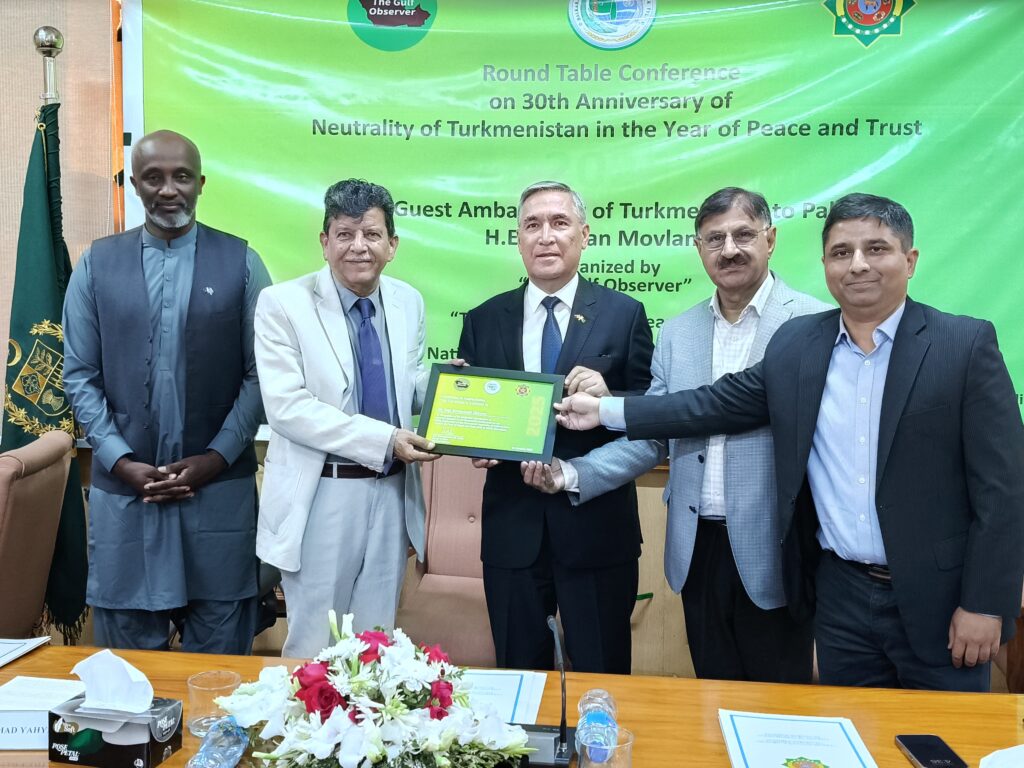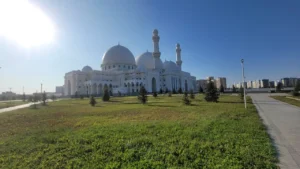Address by Mr. Raja Abdul Qayyum at Round Table Conference on the 30th Anniversary of Turkmenistan’s Neutrality in the Year of Peace and Trust 2025, Islamabad

Islamabad, The Gulf Observer: The Gulf Observer and The Gulf Observer Research Forum and the Embassy of the Republic of Turkmenistan in Pakistan, organized a Round Table Conference at the National Language Promotion Department (NLPD), Islamabad, on 28th October, 2025 to commemorate the 30th Anniversary of Turkmenistan’s Permanent Neutrality — a cornerstone of Turkmenistan’s foreign policy and a beacon of peace, dialogue, and cooperation in the modern world. Mr. Raja Abdul Qayyum delivered address at the Round Table Conference held in Islamabad to commemorate the 30th Anniversary of Turkmenistan’s Neutrality in the Year of Peace and Trust 2025.
Address by Mr. Raja Abdul Qayyum
Excellency, esteemed guests, ladies and gentlemen,
Assalamu Alaikum and good day to you all.
It is both an honor and a privilege to address this distinguished gathering. As a civil servant of Pakistan, I have had the privilege of serving in Moscow and several Central Asian states. During my tenure, I had the opportunity to visit the beautiful city of Ashgabat. I was deeply impressed not only by its remarkable architecture and serene urban landscape but also by the warmth and hospitality of the Turkmen people. Their kindness and graciousness left a lasting impression on me, reflecting the spirit of peace and friendship that defines Turkmenistan.
Pakistan and Turkmenistan’s close relations are indeed the need of the hour and should be further strengthened through frequent interactions and dialogues that emphasize the vast prospects of cooperation for the mutual progress of these two brotherly Muslim nations. Both countries share deep-rooted cultural, linguistic, and religious affinities that form a strong foundation for partnership and understanding. The mausoleum of Jamal ud Din Afghani, whose intellectual legacy profoundly influenced modern Muslim thinkers such as Allama Iqbal, Rashid Raza of Iran, and Muhammad Abduh of Egypt, stands as a symbol of shared philosophical heritage in Ashgabat. Likewise, Turkmenistan’s national poet and thinker, Makhdoom Quli, is revered across the Muslim world for his spiritual and literary contributions. These shared historical and cultural connections, coupled with ongoing cooperation in transformative initiatives such as the TAPI and TAP projects, hold immense potential for enhancing regional connectivity, socio-economic development, and collective prosperity.
Ladies and gentlemen,
The reason we are gathered here today is to commemorate and reflect upon a historic milestone in the modern history of Turkmenistan. In 1995, the United Nations General Assembly unanimously adopted a landmark resolution recognizing Turkmenistan’s permanent neutrality. This declaration marked a turning point — affirming the country’s distinctive role in advancing peace, stability, and cooperation both within the region and across the world.
Since that historic moment, Turkmenistan has steadfastly upheld neutrality as the cornerstone of its foreign policy. Guided by the principles of dialogue, cooperation, and mutual respect, the nation has demonstrated how neutrality can serve as a force for understanding and progress among nations.
Under the visionary leadership of His Excellency Qurbanquly Berdimuhamedov, Turkmenistan strengthened its commitment to peace through proactive diplomacy and international engagement. His Excellency championed initiatives that emphasized regional connectivity, humanitarian cooperation, and sustainable development — recognizing these as pathways to enduring stability. Through his leadership, Turkmenistan emerged as a bridge of peace, linking nations through dialogue, mutual understanding, and shared prosperity.
Over the past thirty years, the Government of Turkmenistan has consistently translated the principle of permanent neutrality into action. It has maintained friendly relations with neighboring countries, refrained from joining military alliances, and prioritized dialogue as a vital tool for conflict prevention. This balanced approach has enabled Turkmenistan to host peace talks and contribute meaningfully to mediation efforts within Central Asia and beyond. Furthermore, its neutral stance has facilitated the development of vital regional connectivity projects — including transport corridors, energy pipelines, and trade routes — that have become engines of economic cooperation and collective growth.
His Excellency Serdar Berdimuhamedov has emphasized innovation, digital diplomacy, and environmental stewardship as integral components of the nation’s peaceful foreign policy. By actively supporting multilateralism through the United Nations and regional organizations, he has reaffirmed Turkmenistan’s role as a beacon of peace and understanding.
The massoulium of Jamal ud din Afghani who influenced the thought of modern muslim thinkers and scholars including our national poet philosopher Allama Iqbal, Rashid Raza Of Iran and Muhammad Abdu of Egypt is in Ashgabat and national poet, thinker of Turkimanistan Makhdoom Quli is a world famous muslim saint, poet and thinker. We have so many commonalities and are already cooperating in the game changing projects TAPI and TAP for regional connectivity and socio-economic development
Through this leadership, Turkmenistan demonstrates that neutrality does not mean isolation. On the contrary, it represents an active, dynamic, and forward-looking approach — one that seeks to build bridges rather than barriers, and to nurture a world rooted in harmony, dialogue, and sustainable development.
In conclusion, Turkmenistan’s journey of neutrality over the past three decades stands as an inspiring example to the international community. It reminds us that peace is not a passive state, but a living commitment — one that must be renewed every day through understanding, cooperation, and goodwill.
In the end, I would like to recite a few verses from Faiz Ahmed Faiz’s Urdu poem dedicated to the beauty of Ashgabat.
اشک آباد کی شام
فیض احمد فیض
جب سورج نے جاتے جاتے
اشک آباد کے نیلے افق سے
اپنے سنہری جام میں ڈھالی
سرخیِ اوّلِ شام
اور یہ جام
تمہارے سامنے رکھ کر
تم سے کیا کلام
کہا، پرنام —
اُٹھو!
اور اپنے تن کی سیج سے اُٹھ کر
اِک شیریں پیغام
ثبت کرو اُس شام
کسی کے نام، کنارِ جام
شاید تم یہ مان گئیں
اور تم نے اپنے لبِ گلفام
کیے انعام کسی کے نام
کنارِ جام
یا شاید
تم اپنے تن کی سیج پہ سج کر
تھیں یوں محوِ آرام
کہ رستے تکتے تکتے
بجھ گئی شمعِ جام
اشک آباد کے نیلے افق پر
غارت ہو گئی شام
Thankyou.


